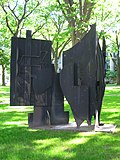Night Wall I
Night Wall I is a medical condition characterized by a series of symptoms that primarily manifest during the nighttime. This condition is distinct due to its unique combination of symptoms and the specific time frame in which they occur, affecting the patient's sleep patterns and overall nocturnal behavior.
Symptoms[edit]
The primary symptoms of Night Wall I include:
- Insomnia or severe difficulty in falling asleep
- Nightmares or frequent, intense dreams that cause distress
- Sleep paralysis, where individuals temporarily experience an inability to move while falling asleep or upon waking
- Nocturnal panic attacks, which are sudden episodes of intense fear that occur without a clear trigger during the night
- Restless Legs Syndrome (RLS), a disorder that causes an uncontrollable urge to move one's legs
Causes[edit]
The exact causes of Night Wall I are not well understood, but several factors are believed to contribute to its development:
- Genetic predisposition may play a role, as the condition seems to occur more frequently in individuals with a family history of similar symptoms.
- Stress and anxiety are also considered significant contributing factors, as they can exacerbate or trigger the symptoms associated with Night Wall I.
- Neurological imbalances or disruptions in the body's sleep-wake cycle may also contribute to the manifestation of this condition.
Diagnosis[edit]
Diagnosing Night Wall I typically involves a comprehensive evaluation that includes:
- A detailed medical and sleep history
- A physical examination
- Sleep studies such as polysomnography to monitor sleep stages and detect abnormalities in the sleep cycle
- Psychological evaluations to assess mental health conditions that might be contributing to the symptoms
Treatment[edit]
Treatment for Night Wall I is tailored to the individual's specific symptoms and may include:
- Cognitive Behavioral Therapy (CBT) for insomnia, which helps patients alter thoughts and behaviors that disrupt sleep
- Medications such as antidepressants or anti-anxiety drugs to manage underlying mental health issues
- Lifestyle changes, including establishing a regular sleep schedule, reducing caffeine intake, and creating a bedtime routine that promotes relaxation
Prognosis[edit]
The prognosis for individuals with Night Wall I varies. With appropriate treatment, many patients see a significant improvement in their symptoms and overall quality of life. However, some individuals may experience persistent symptoms and may require long-term management strategies.
Epidemiology[edit]
The prevalence of Night Wall I is not well documented, as it is a relatively rare and recently identified condition. Further research is needed to understand the epidemiological aspects of this disorder.
See Also[edit]
Night Wall I[edit]
Ad. Transform your life with W8MD's Budget GLP-1 injections from $49.99


W8MD offers a medical weight loss program to lose weight in Philadelphia. Our physician-supervised medical weight loss provides:
- Weight loss injections in NYC (generic and brand names):
- Zepbound / Mounjaro, Wegovy / Ozempic, Saxenda
- Most insurances accepted or discounted self-pay rates. We will obtain insurance prior authorizations if needed.
- Generic GLP1 weight loss injections from $49.99 for the starting dose of Semaglutide and $65.00 for Tirzepatide.
- Also offer prescription weight loss medications including Phentermine, Qsymia, Diethylpropion, Contrave etc.
NYC weight loss doctor appointmentsNYC weight loss doctor appointments
Start your NYC weight loss journey today at our NYC medical weight loss and Philadelphia medical weight loss clinics.
- Call 718-946-5500 to lose weight in NYC or for medical weight loss in Philadelphia 215-676-2334.
- Tags:NYC medical weight loss, Philadelphia lose weight Zepbound NYC, Budget GLP1 weight loss injections, Wegovy Philadelphia, Wegovy NYC, Philadelphia medical weight loss, Brookly weight loss and Wegovy NYC
|
WikiMD's Wellness Encyclopedia |
| Let Food Be Thy Medicine Medicine Thy Food - Hippocrates |
Medical Disclaimer: WikiMD is not a substitute for professional medical advice. The information on WikiMD is provided as an information resource only, may be incorrect, outdated or misleading, and is not to be used or relied on for any diagnostic or treatment purposes. Please consult your health care provider before making any healthcare decisions or for guidance about a specific medical condition. WikiMD expressly disclaims responsibility, and shall have no liability, for any damages, loss, injury, or liability whatsoever suffered as a result of your reliance on the information contained in this site. By visiting this site you agree to the foregoing terms and conditions, which may from time to time be changed or supplemented by WikiMD. If you do not agree to the foregoing terms and conditions, you should not enter or use this site. See full disclaimer.
Credits:Most images are courtesy of Wikimedia commons, and templates, categories Wikipedia, licensed under CC BY SA or similar.
Translate this page: - East Asian
中文,
日本,
한국어,
South Asian
हिन्दी,
தமிழ்,
తెలుగు,
Urdu,
ಕನ್ನಡ,
Southeast Asian
Indonesian,
Vietnamese,
Thai,
မြန်မာဘာသာ,
বাংলা
European
español,
Deutsch,
français,
Greek,
português do Brasil,
polski,
română,
русский,
Nederlands,
norsk,
svenska,
suomi,
Italian
Middle Eastern & African
عربى,
Turkish,
Persian,
Hebrew,
Afrikaans,
isiZulu,
Kiswahili,
Other
Bulgarian,
Hungarian,
Czech,
Swedish,
മലയാളം,
मराठी,
ਪੰਜਾਬੀ,
ગુજરાતી,
Portuguese,
Ukrainian

